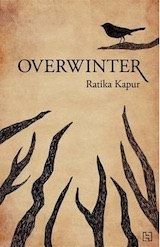Overwinter
Ratika Kapur
|
Overwinter is to wait out the worst of winter. Generally, animals overwinter by either migrating or hibernating. In Ratika Kapur’s debut novel, the protagonist Ketaki faces a winter of not just discontent but also tragedy and confusion. Ostensibly, Ketaki has a charmed existence. She’s a graphic designer who studied in the right school, went to New York and then returned to India. Her work is impressive and there are clients looking forward to her designs. She has her own flat. She has a string of lovers at her beck and call. There seem to be no struggles and no reasons for angst. But this well-ordered life is like the thin film of ice that covers a lake in winter. One misstep, and it can crack and plunge you into the tangled, emotional mess that lies beneath. Overwinter opens with Ketaki lying in the dark, on a bed next to a man. Her hand traces his body, from Adam’s apple to his genitalia. The man is brain-dead and incapable of feeling or responding to her touch. He is also her uncle — her maasi’s husband — and the man who raised her like a father. Ketaki’s story, however, is not a standard story of abuse suffered silently within the confines of a family. Neither is it a Lolita-esque tale of how an older man lusted after a little girl. Overwinter unfurls elegantly, revealing unexpected details and twists that serve to both untangle and tighten the emotional knot that Ketaki carries around with her all the time. It impacts her every relationship, whether it is with her aunt, her biological father, her lovers or her dead mother. In terms of plot, events take place steadily: Ketaki’s uncle suffers from a stroke, Ketaki finds herself in the middle of a modern arranged marriage setup, Ketaki’s father tells her a family secret that has been the elephant in the room for decades, Ketaki’s uncle dies, and so on. However, the story of Overwinter is one that is about the intangible feelings and abstract, emotional meanderings that rush like currents beneath the river of these plot points. Somewhere near the middle, Ketaki wonders about herself while sitting with a group of friends, all of whom seem to be balanced and settled. “She has been told she is a coward, and then she has been hailed fearless; she has been called a bitch, a baby, an angel; kind, too kind, some have said; aggressive, depressive, a basket case, said others. Now does that make her more fascinating…Or just out-and-out f**ked up?” There are no simple answers in Overwinter, but the questions give both Ketaki and the reader a lot to think about. As the novel progresses, it becomes clear that while some people really are as balanced as they appear, few facades are uncomplicated. (Warning: those who don’t like spoilers should skip to the next paragraph.) Ketaki learns from her father that her mother and uncle had a long-standing affair. As she remembers her own relationship with her uncle, she realises that he had been moulding her to become like her mother. He made her learn the same sport, he tried to encourage Ketaki to be an artist like her mother. Suddenly, Ketaki finds herself floundering. For years, her anchor has been the closeness she shared with her uncle. Now it seems that she was loved because he saw her as a clone of a dead woman. Overwinter is written entirely from Ketaki’s perspective, thus earning the novel the tag of being ‘woman-centric’. Fortunately, Kapur’s men are as credible as her women and they’re not the villains. There are no bad guys in Overwinter; only many confused ones. The character of Ketaki doesn’t feel conventional or clichéd. Instead, she feels powerfully real. Through Ketaki, Kapur eloquently articulates the complexity of being a woman in contemporary India and walking the tightrope of social expectations. Neera, Ketaki’s aunt, is another beautifully-etched character. Her silences and whimsical shifts in mood seem petulant at first and then, as the novel delves deeper into family history, they become poignant indicators of how terribly trapped Neera felt in her circumstances. While there are sections that slacken the pace of the novel (particularly Ketaki’s foray into arranged-marriage territory) and some of the conversations do feel forced, Overwinter is, in most parts, a finely-crafted novel and it’s not surprising that Kapur was on the longlist for the Man Asian Literary Prize for this book. One of Kapur’s strengths is her ability to describe her chosen setting, Delhi. From Sarus cranes in Okhla to Nizamuddin to Gurgaon, each area that Kapur has picked is perfect for the scenes that she locates in them. In her descriptions is the simple intimacy that comes from knowing a place well. Add to that well-observed characters, and you have a story that lingers with you. Deepanjana Pal | 4 Mar 2012 | Sunday-Guardian
|

 Hardcover: 248
Hardcover: 248 Ratika Kapur
Ratika Kapur